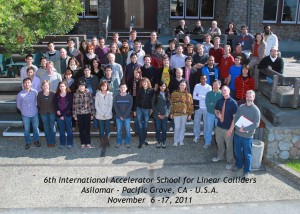Today, I am pleased to announce that the Seventh International Accelerator School for Linear Colliders will be held from 27 November to 8 December 2012 at the Radisson Blu Hotel in Indore, India. These Linear Collider accelerator schools have been helping fill the need to provide training for young scientists interested in pursuing careers in accelerator physics. The schools have been very popular and have attracted a very large number of qualified applicants from around the world, including graduate students, young researchers interested in switching fields and young researchers already involved in accelerator physics but desiring the learning experience provided by the school. The students admitted to the school receive partial or full financial support, including travel to the school.
The ILC Global Design Effort is organising the school in partnership with the CLIC Study group and the ICFA Beam Dynamics Panel. Our host this year is the Raja Ramanna Centre for Advanced Technology and the venue will be the Radisson Blu Hotel in Indore, India. The school is rotated each year between Asia, Europe and the Americas, and last year’s school was held in Asilomar, California, USA.
This year’s school will again focus on subjects in accelerator physics that are directly related to developing a teraelectronvolt-scale lepton colliders, such as the International Linear Collider (ILC), the Compact Linear Collider (CLIC) study or a high-energy muon collider. Developing the technology and design for such a high-energy lepton collider presents many challenges in accelerator physics, in order to be capable of complementing the Large Hadron Collider. As a result, linear collider accelerator physicists are working on problems that are at the very forefront of the field. The school offers the special opportunity to learn about these topics from the leading accelerator physicists in the field and provides a unique learning experience for students interested in becoming accelerator scientists.
The curriculum this year will consist of two courses, both related to the accelerator physics of linear colliders. All students will participate in an introductory course on TeV-scale future lepton colliders (ILC, CLIC, muon collider and other advanced colliders), followed by a half-day lecture on linac basics and beam instrumentation. Then, the students will divide into two specialty tracks: Track A – accelerator physics for sources, damping rings, linacs and beam delivery system; and Track B – superconducting and warm RF technology, LLRF and high-power RF and beam instrumentation. Students interested in both tracks can apply to attend the school a second year. An interesting innovation in this year’s programme is that each student will perform two hands-on experiments, choosing from experiments on SRF cavity measurements, characterisation of RF components or beam profile measurement.
Since so few universities offer a PhD in accelerator physics, accelerator schools play a very important role in providing academic training. Most accelerator physicists have come into the field following their academic studies in other fields. High-energy physics laboratories around the world have major programmes in advanced accelerator R&D to develop accelerators of the future, and these efforts provide many opportunities for scientists and engineers to become involved in accelerator physics and advanced technology projects. The ongoing work towards a next-generation lepton collider involves many of the leading accelerator scientists in the world and many challenging and forward-looking accelerator issues and technologies. Therefore, an accelerator school connected to this work makes for an excellent learning experience.
We are happy to once again be able to offer a school based on lepton collider accelerator physics this autumn in Indore, India. We encourage all those interested in an intensive and rewarding experience focused on forefront issues in accelerator physics to apply by the 20 July 2012 deadline.




ILC Provide a great platform for those who want to move there career into challenging field of research in the field of high energy physics. It gives a biggest platform to the researcher.
Dr. Arvind Yogi